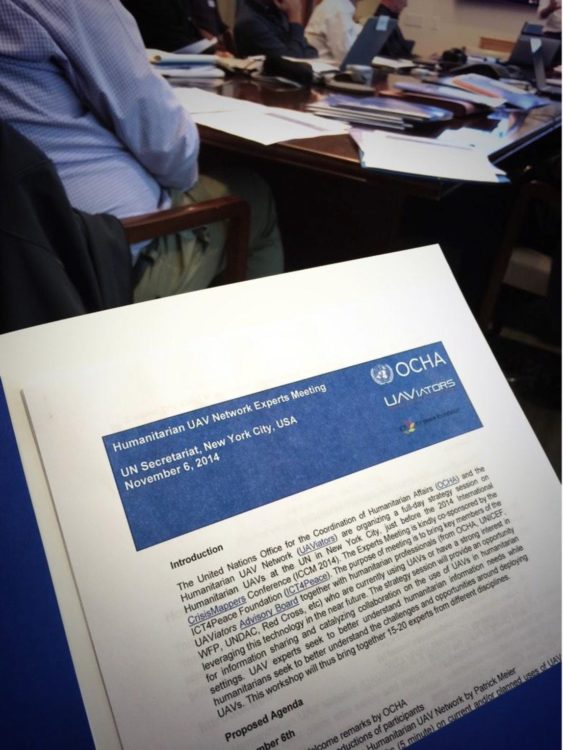
Co-sponsored by the ICT4Peace Foundation, the UAViators.org Experts Meeting on Humanitarian UAVs was held at the UN Secretariat in New York on Thursday, 6th November 2014.
A full report by the organisers around the closed door meeting, which was held under the Chatham House rule, will be made public soon.
The ICT4Peace Foundation is a founding member of the advisory board of UAViators.org, focussing in particular on the use of UAVs in conflict zones and the ethics around the use of UAVs for even humanitarian aid.
As noted by Patrick Meier,
The Humanitarian UAV Network (UAViators) and the United Nations Office for the Coordination of Humanitarian Affairs (OCHA) are co-organizing the first ever “Experts Meeting on Humanitarian UAVs” on November 6th at UN Head-quarters in New York. This full-day strategy meeting, which is co-sponsored by the ICT for Peace Foundation (ICT4Peace) and QCRI, will bring together leading UAV experts (including several members of the UAV Network’s Advisory Board, such as DJI) with seasoned humanitarian professionals from OCHA, WFP, UNICEF, UNHCR, UNDAC, IOM, American Red Cross, European Commission and several other groups that are also starting to use civilian UAVs or have a strong interest in leveraging this technology.
Sanjana Hattotuwa, who represented the Foundation and has been engaged with UAViators.org since its inception, articulated a number of points during the meeting, which included, inter alia,
- How “safe and mature” UAVs really were, in light of the fact that mid-air collision detection technology across the spectrum of UAVs in operation just today wasn’t present.
- Issues around sovereignty in the use of UAVs, in contradistinction to satellite imagery.
- The ethics of working in the Global South as the testing ground for UAV operations.
- Eschewing the usual marketing spiel, evidence based case studies around the use of UAVs to actually save lives, and deliver aid in a more timely and effective manner.
- The need to focus less on manufacturer or international NGO claims around the utility of UAVs and get more voices from affected communities to speak out around how have used, and intend to use UAVs.
- The need to have a rights based approach to community engagement regarding the use of UAVs, ensuring they have access to the imagery gathered.
- The danger of weaponisation, not just of the UAVs themselves, but of downstream imagery acquisition, used by some actors, long after a disaster, to harm local populations.
- The need to problematise “community engagement”, noting that in violent conflict, communities are often rent asunder, making it very difficult to engage them meaningfully without exacerbating drivers of violent conflict.
The Foundation will be involved in the publication of the final report on this meeting, and will publish it on this website when it is ready for release.
